Module 3 Sports.Unit 1 Nothing is more exciting than playing tennis课件(28张PPT)
文档属性
| 名称 | Module 3 Sports.Unit 1 Nothing is more exciting than playing tennis课件(28张PPT) |
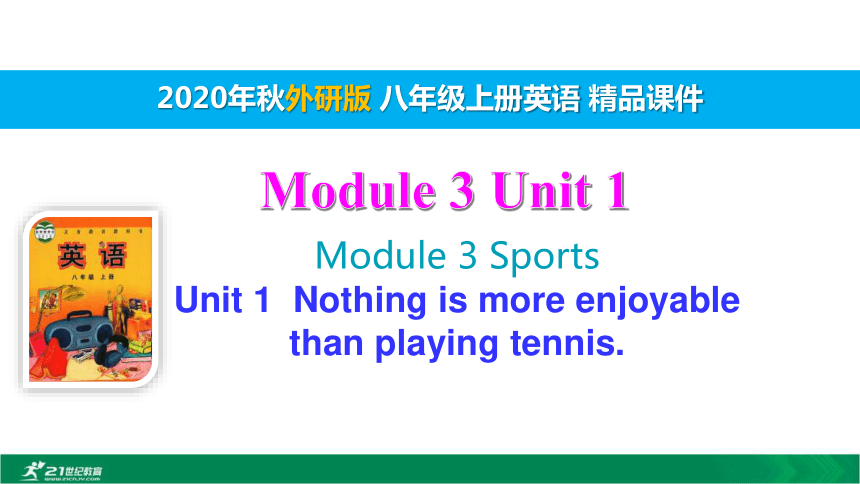
|
|
| 格式 | pptx | ||
| 文件大小 | 8.1MB | ||
| 资源类型 | 试卷 | ||
| 版本资源 | 外研版 | ||
| 科目 | 英语 | ||
| 更新时间 | 2020-08-11 00:00:00 | ||
图片预览

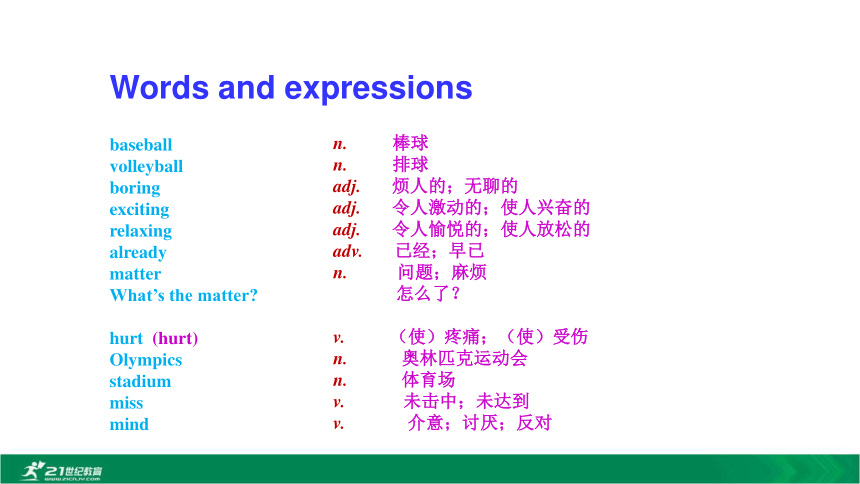
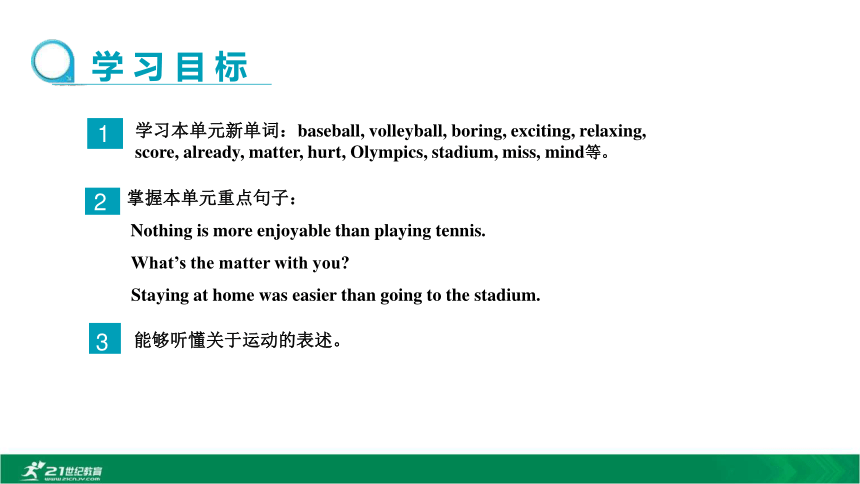
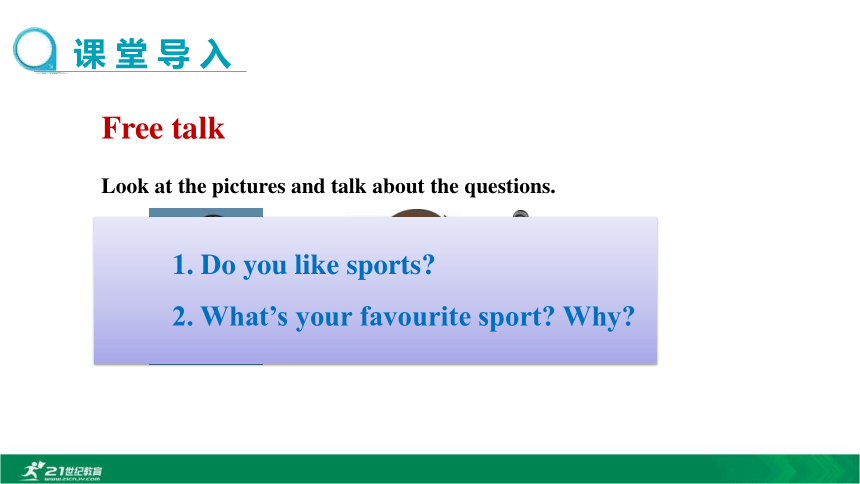
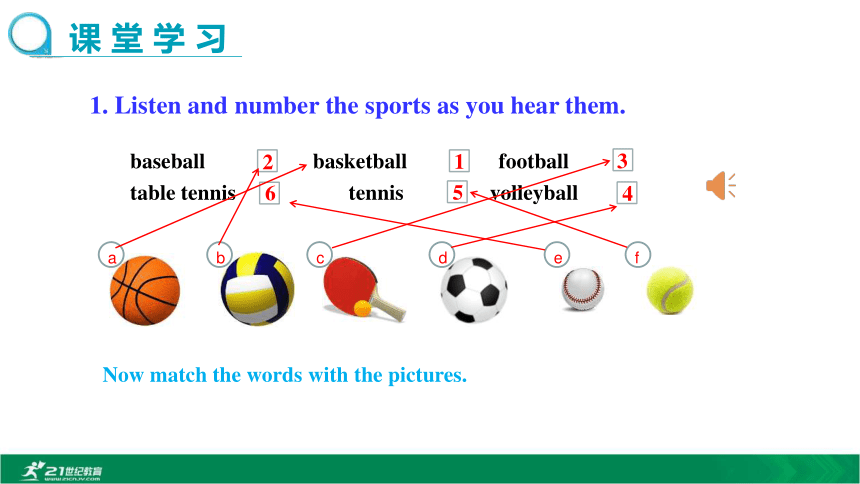


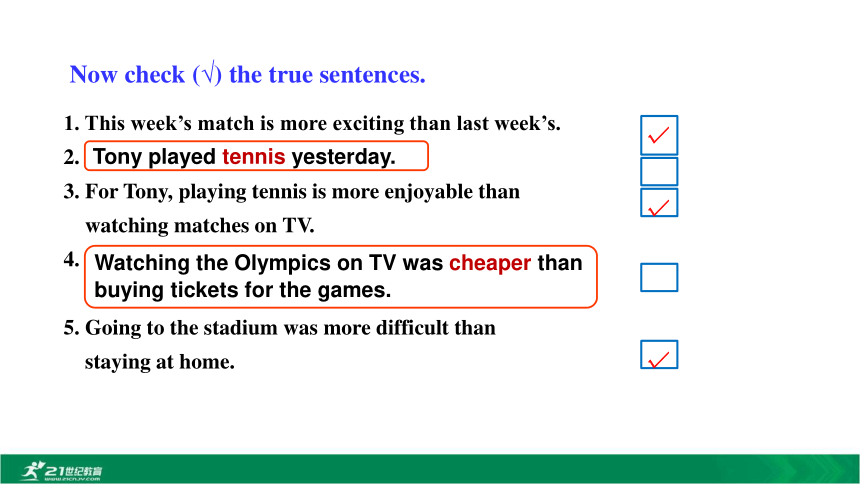
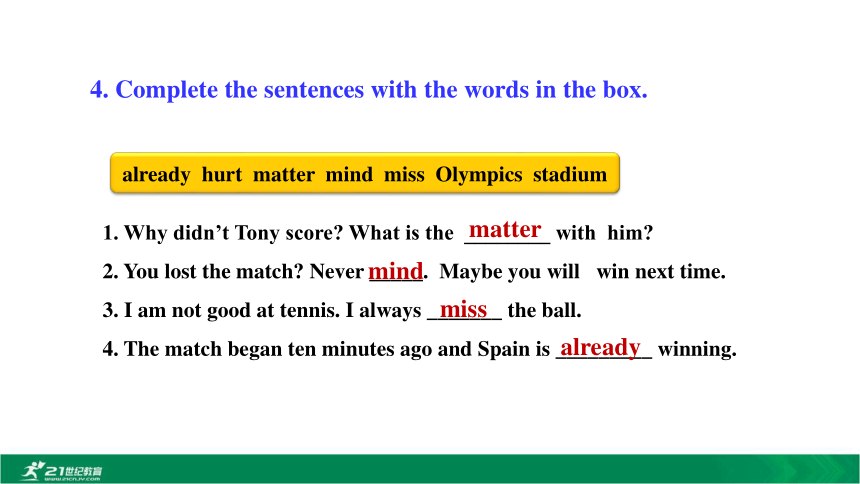
文档简介
2020年秋外研版 八年级上册英语 精品课件
Module 3 Unit 1
Module 3 Sports
Unit 1 Nothing is more enjoyable than playing tennis.
Words and expressions
baseball
volleyball
boring
exciting
relaxing
already
matter
What’s the matter?
hurt (hurt)
Olympics
stadium
miss
mind
n. 棒球
n. 排球
adj. 烦人的;无聊的
adj. 令人激动的;使人兴奋的
adj. 令人愉悦的;使人放松的
adv. 已经;早已
n. 问题;麻烦
怎么了?
v. (使)疼痛;(使)受伤
n. 奥林匹克运动会
n. 体育场
v. 未击中;未达到
v. 介意;讨厌;反对
学 习 目 标
学习本单元新单词:baseball, volleyball, boring, exciting, relaxing,
score, already, matter, hurt, Olympics, stadium, miss, mind等。
1
3
能够听懂关于运动的表述。
掌握本单元重点句子:
Nothing is more enjoyable than playing tennis.
What’s the matter with you?
Staying at home was easier than going to the stadium.???
2
课 堂 导 入
Free talk
Look at the pictures and talk about the questions.
1. Do you like sports?
2. What’s your favourite sport? Why?
课 堂 学 习
1. Listen and number the sports as you hear them.
baseball basketball football
table tennis tennis volleyball
a
b
c
d
e
f
Now match the words with the pictures.
6
2
1
3
5
4
2. Look at the sports in Activity 1 and talk about them. Use the words in the box to help you.
boring dangerous difficult easy exciting expensive popular relaxing safe
A: What’s table tennis like?
B: It’s safe and relaxing.
3. Listen and read.
1. Which team scored a minute ago?
A. Spain B. England C. Germany
2. What was last week’s match like?
A. exciting B. relaxing C. boring
3. Tony hurt his _____ last night in the tennis match.
A. arm B. knee C. eye
Listen and choose.
Now check (√) the true sentences.
1. This week’s match is more exciting than last week’s.
2. Tony played table tennis yesterday.
3. For Tony, playing tennis is more enjoyable than
watching matches on TV.
4. Watching the Olympics on TV was more expensive
than buying tickets for the games.
5. Going to the stadium was more difficult than
staying at home.
√
√
√
Tony played tennis yesterday.
Watching the Olympics on TV was cheaper than buying tickets for the games.
4. Complete the sentences with the words in the box.
already hurt matter mind miss Olympics stadium
1. Why didn’t Tony score? What is the ________ with him?
2. You lost the match? Never _____. Maybe you will win next time.
3. I am not good at tennis. I always _______ the ball.
4. The match began ten minutes ago and Spain is _________ winning.
matter
miss
already
mind
5. The 2008 __________ were held in Beijing.
6. Watching football at home is easier than going to
the __________.
7. Tennis is a little dangerous because you may
_______ your knee.
Olympics
hurt
stadium
5. Complete the passage about yourself. Use the words in Activity 1 to help you.
My favourite sport is (1) __________. And I enjoy watching (2) ___________. I am quite good at (3) __________. I do not like playing (4) _________. And I am not very good at (5) _________.
Possible answers:
table tennis
football
swimming
baseball
volleyball
— What’s the score?比分是多少?
— Spain scored a minute ago. 西班牙(队)一分钟前得分了。
score 在第一个句子中是名词,意思是“比分,进球数”;
第二个句子中的score 是动词,表示“得分;进球”。
例:The final score was 3:2. 最终比分为三比二。
Arsenal scored in the final minute of the game.
阿森纳队在比赛的最后一分钟进了一球。
Language points
2. Last week the match on TV was so boring because no
one scored at all. 上周电视上的比赛真无聊,因为根
本就没有人得分。
boring 指事情本身无趣,常用来修饰或描述物;而bored
指“感到厌烦的”,用来形容或描述人的感受。
例:This history class is really boring and I feel very
bored with it.
这节历史课真无聊,我对它感到很厌烦。
{E8B1032C-EA38-4F05-BA0D-38AFFFC7BED3}用来修饰物,指事物本身的属性
用来修饰人,指人的感受
tiring
tired
interesting
interested
relaxing
relaxed
moving
moved
exciting
excited
surprising
surprised
【拓展】 用来修饰人或物的常见形容词:
3. So this week’s match is already more exciting.
所以这周的比赛已经令人兴奋多了。
already 副词,意为“已经;早已”。通常用于肯
定句中,置于实义动词前,系动词或助动词后,
有时为了表示惊奇,还可放在句末。
例:I have already seen that film three times.
那场电影我已经看过三遍了。
4. What’s the matter with you, Tony?
你怎么了,托尼?
What’s the matter with you? 意为“你怎么了?/
你有什么麻烦 / 烦恼了?”, 常用于询问某人患
了何种疾病或遇到了何种麻烦。既可以询问人,
也可以询问物。
例:— What’s the matter with your mother?
你妈妈怎么了?
— She is ill in hospital.她生病住院了。
5. Nothing is more enjoyable than playing tennis.
没有什么比打网球更令人愉快的了。
enjoyable 形容词,意为“令人愉快的,有乐趣的”。
其同义词是pleasant。
例:We had an enjoyable journey.
我们度过了一次愉快的旅行。
【拓展】enjoy 动词,意为“欣赏;享受;喜爱”。
后面跟名词或动词-ing形式。enjoy doing sth.喜欢做
某事;enjoy oneself 玩得高兴;过得愉快。
例:I enjoy going shopping with my mother on Sunday.
我喜欢星期天和妈妈去购物。
6. Well, I’m not sure about that.
哦,我不确定是那样的。
be sure about = be sure of 意为“对……有把握;确
信……”,后面接名词、代词或 动词-ing形式。
例:I am sure about the job. 我对这项工作有把握。
【拓展】be sure to do sth. 必定做某事;务必做某事;
be sure + 宾语从句,意为“确信……”。
例:Be sure to finish your homework on time.
务必按时完成作业。
I’m sure you can run faster than Li Lei.
我确信你比李磊跑得快。
7. Never mind. 没关系。
(1) never mind 意为“不要紧;没关系;别担心”,用于安慰、鼓励对方。
例:A: We missed the train.我们错过了火车。
B: Never mind. There’s another one in 20 minutes.
没关系的,20分钟后 还有一辆。
(2) mind 作动词时,意为“介意;讨厌;反对”,后面可接名词、代词或
动词 -ing形式作宾语,多用于疑问句或否定句。
例:Do you mind opening the window?
你介意打开窗子吗?
8. There’s still plenty of time for them to score.
他们还有很多时间可以得分。
(1) plenty of 意为“大量;很多”,既可以修饰可数名词
复数,也可以修饰不可数名词。
例:Plenty of students took part in the game.
许多学生参加了这个比赛。
(2) plenty 作代词,意为“大量;众多”。
例:They always give me plenty to eat.
他们总是给我很多东西吃。
1. Spain scored a minute ago.
2. Last week the match on TV was so boring because no one scored at all.
3. Oh, look at that.
英语连读发音原则:
辅音+元音 ,即前一个单词由辅音结尾,后一个单词由元音开头,自然地连起来。
Now listen again and repeat.
6. Listen and notice how the speaker links the words.
7. Work in pairs. Talk about the sports you like.
— Hey, Bruce. Which sport do you like,
swimming or running?
— I like swimming. It’s more relaxing
than running.
课 堂 达 标
I.单项选择。
1. Of the two coats, she'd like to choose the _____ one to save money for a book.
A. cheapest B. cheaper C. more expensive D. most expensive
2. It was a ____ day and she feels very _____.
A. tiring; tired B. tiring; tiring
C. tired; tiring D. tired; tired
3. —Which do you like _____, summer or winter?
—I prefer summer.
A. good B. well C. better D. best
4. —How do you like your new job in the bank?
—It's ___. I do exactly the same thing every day.
A. interesting B. exciting
C. surprising D. boring
5. After practicing for several months, I can swim
much _____ now.
A. slower B. slowest C. faster D. fastest
6. — It's so cold today.
— Yes, it's ____ colder than it was yesterday.
A. some B. more C. very D. much
1. 约翰怎么啦?
________ the _______ with John?
2. 我们确信能赢这场比赛。
We ____ _____ _____ winning the match.
3. 汤姆一点儿也不喜欢西餐。
Tom doesn’t like western food _____ _____.
4. 我喜欢在电视上观看比赛。
I enjoy __________ the match ____ TV.
5. 那是因为他的膝盖受伤了。
That was ________ he ____ his knee.
What’s matter
are sure about
at all
watching on
because hurt
Ⅱ.完成句子
1. Read and retell the dialogue.
2. Remember the words and expressions of Unit1.
Homework
谢谢
21世纪教育网(www.21cnjy.com) 中小学教育资源网站
有大把高质量资料?一线教师?一线教研员?
欢迎加入21世纪教育网教师合作团队!!月薪过万不是梦!!
详情请看:
https://www.21cnjy.com/help/help_extract.php
Module 3 Unit 1
Module 3 Sports
Unit 1 Nothing is more enjoyable than playing tennis.
Words and expressions
baseball
volleyball
boring
exciting
relaxing
already
matter
What’s the matter?
hurt (hurt)
Olympics
stadium
miss
mind
n. 棒球
n. 排球
adj. 烦人的;无聊的
adj. 令人激动的;使人兴奋的
adj. 令人愉悦的;使人放松的
adv. 已经;早已
n. 问题;麻烦
怎么了?
v. (使)疼痛;(使)受伤
n. 奥林匹克运动会
n. 体育场
v. 未击中;未达到
v. 介意;讨厌;反对
学 习 目 标
学习本单元新单词:baseball, volleyball, boring, exciting, relaxing,
score, already, matter, hurt, Olympics, stadium, miss, mind等。
1
3
能够听懂关于运动的表述。
掌握本单元重点句子:
Nothing is more enjoyable than playing tennis.
What’s the matter with you?
Staying at home was easier than going to the stadium.???
2
课 堂 导 入
Free talk
Look at the pictures and talk about the questions.
1. Do you like sports?
2. What’s your favourite sport? Why?
课 堂 学 习
1. Listen and number the sports as you hear them.
baseball basketball football
table tennis tennis volleyball
a
b
c
d
e
f
Now match the words with the pictures.
6
2
1
3
5
4
2. Look at the sports in Activity 1 and talk about them. Use the words in the box to help you.
boring dangerous difficult easy exciting expensive popular relaxing safe
A: What’s table tennis like?
B: It’s safe and relaxing.
3. Listen and read.
1. Which team scored a minute ago?
A. Spain B. England C. Germany
2. What was last week’s match like?
A. exciting B. relaxing C. boring
3. Tony hurt his _____ last night in the tennis match.
A. arm B. knee C. eye
Listen and choose.
Now check (√) the true sentences.
1. This week’s match is more exciting than last week’s.
2. Tony played table tennis yesterday.
3. For Tony, playing tennis is more enjoyable than
watching matches on TV.
4. Watching the Olympics on TV was more expensive
than buying tickets for the games.
5. Going to the stadium was more difficult than
staying at home.
√
√
√
Tony played tennis yesterday.
Watching the Olympics on TV was cheaper than buying tickets for the games.
4. Complete the sentences with the words in the box.
already hurt matter mind miss Olympics stadium
1. Why didn’t Tony score? What is the ________ with him?
2. You lost the match? Never _____. Maybe you will win next time.
3. I am not good at tennis. I always _______ the ball.
4. The match began ten minutes ago and Spain is _________ winning.
matter
miss
already
mind
5. The 2008 __________ were held in Beijing.
6. Watching football at home is easier than going to
the __________.
7. Tennis is a little dangerous because you may
_______ your knee.
Olympics
hurt
stadium
5. Complete the passage about yourself. Use the words in Activity 1 to help you.
My favourite sport is (1) __________. And I enjoy watching (2) ___________. I am quite good at (3) __________. I do not like playing (4) _________. And I am not very good at (5) _________.
Possible answers:
table tennis
football
swimming
baseball
volleyball
— What’s the score?比分是多少?
— Spain scored a minute ago. 西班牙(队)一分钟前得分了。
score 在第一个句子中是名词,意思是“比分,进球数”;
第二个句子中的score 是动词,表示“得分;进球”。
例:The final score was 3:2. 最终比分为三比二。
Arsenal scored in the final minute of the game.
阿森纳队在比赛的最后一分钟进了一球。
Language points
2. Last week the match on TV was so boring because no
one scored at all. 上周电视上的比赛真无聊,因为根
本就没有人得分。
boring 指事情本身无趣,常用来修饰或描述物;而bored
指“感到厌烦的”,用来形容或描述人的感受。
例:This history class is really boring and I feel very
bored with it.
这节历史课真无聊,我对它感到很厌烦。
{E8B1032C-EA38-4F05-BA0D-38AFFFC7BED3}用来修饰物,指事物本身的属性
用来修饰人,指人的感受
tiring
tired
interesting
interested
relaxing
relaxed
moving
moved
exciting
excited
surprising
surprised
【拓展】 用来修饰人或物的常见形容词:
3. So this week’s match is already more exciting.
所以这周的比赛已经令人兴奋多了。
already 副词,意为“已经;早已”。通常用于肯
定句中,置于实义动词前,系动词或助动词后,
有时为了表示惊奇,还可放在句末。
例:I have already seen that film three times.
那场电影我已经看过三遍了。
4. What’s the matter with you, Tony?
你怎么了,托尼?
What’s the matter with you? 意为“你怎么了?/
你有什么麻烦 / 烦恼了?”, 常用于询问某人患
了何种疾病或遇到了何种麻烦。既可以询问人,
也可以询问物。
例:— What’s the matter with your mother?
你妈妈怎么了?
— She is ill in hospital.她生病住院了。
5. Nothing is more enjoyable than playing tennis.
没有什么比打网球更令人愉快的了。
enjoyable 形容词,意为“令人愉快的,有乐趣的”。
其同义词是pleasant。
例:We had an enjoyable journey.
我们度过了一次愉快的旅行。
【拓展】enjoy 动词,意为“欣赏;享受;喜爱”。
后面跟名词或动词-ing形式。enjoy doing sth.喜欢做
某事;enjoy oneself 玩得高兴;过得愉快。
例:I enjoy going shopping with my mother on Sunday.
我喜欢星期天和妈妈去购物。
6. Well, I’m not sure about that.
哦,我不确定是那样的。
be sure about = be sure of 意为“对……有把握;确
信……”,后面接名词、代词或 动词-ing形式。
例:I am sure about the job. 我对这项工作有把握。
【拓展】be sure to do sth. 必定做某事;务必做某事;
be sure + 宾语从句,意为“确信……”。
例:Be sure to finish your homework on time.
务必按时完成作业。
I’m sure you can run faster than Li Lei.
我确信你比李磊跑得快。
7. Never mind. 没关系。
(1) never mind 意为“不要紧;没关系;别担心”,用于安慰、鼓励对方。
例:A: We missed the train.我们错过了火车。
B: Never mind. There’s another one in 20 minutes.
没关系的,20分钟后 还有一辆。
(2) mind 作动词时,意为“介意;讨厌;反对”,后面可接名词、代词或
动词 -ing形式作宾语,多用于疑问句或否定句。
例:Do you mind opening the window?
你介意打开窗子吗?
8. There’s still plenty of time for them to score.
他们还有很多时间可以得分。
(1) plenty of 意为“大量;很多”,既可以修饰可数名词
复数,也可以修饰不可数名词。
例:Plenty of students took part in the game.
许多学生参加了这个比赛。
(2) plenty 作代词,意为“大量;众多”。
例:They always give me plenty to eat.
他们总是给我很多东西吃。
1. Spain scored a minute ago.
2. Last week the match on TV was so boring because no one scored at all.
3. Oh, look at that.
英语连读发音原则:
辅音+元音 ,即前一个单词由辅音结尾,后一个单词由元音开头,自然地连起来。
Now listen again and repeat.
6. Listen and notice how the speaker links the words.
7. Work in pairs. Talk about the sports you like.
— Hey, Bruce. Which sport do you like,
swimming or running?
— I like swimming. It’s more relaxing
than running.
课 堂 达 标
I.单项选择。
1. Of the two coats, she'd like to choose the _____ one to save money for a book.
A. cheapest B. cheaper C. more expensive D. most expensive
2. It was a ____ day and she feels very _____.
A. tiring; tired B. tiring; tiring
C. tired; tiring D. tired; tired
3. —Which do you like _____, summer or winter?
—I prefer summer.
A. good B. well C. better D. best
4. —How do you like your new job in the bank?
—It's ___. I do exactly the same thing every day.
A. interesting B. exciting
C. surprising D. boring
5. After practicing for several months, I can swim
much _____ now.
A. slower B. slowest C. faster D. fastest
6. — It's so cold today.
— Yes, it's ____ colder than it was yesterday.
A. some B. more C. very D. much
1. 约翰怎么啦?
________ the _______ with John?
2. 我们确信能赢这场比赛。
We ____ _____ _____ winning the match.
3. 汤姆一点儿也不喜欢西餐。
Tom doesn’t like western food _____ _____.
4. 我喜欢在电视上观看比赛。
I enjoy __________ the match ____ TV.
5. 那是因为他的膝盖受伤了。
That was ________ he ____ his knee.
What’s matter
are sure about
at all
watching on
because hurt
Ⅱ.完成句子
1. Read and retell the dialogue.
2. Remember the words and expressions of Unit1.
Homework
谢谢
21世纪教育网(www.21cnjy.com) 中小学教育资源网站
有大把高质量资料?一线教师?一线教研员?
欢迎加入21世纪教育网教师合作团队!!月薪过万不是梦!!
详情请看:
https://www.21cnjy.com/help/help_extract.php
同课章节目录
- Module 1 How to learn English
- Unit 1 Let's try to speak English as much as possi
- Unit 2 You should smile at her.
- Unit 3 Language in use .
- Module 2 My home town and my country
- Unit 1 It's taller than many other buildings.
- Unit 2 Cambridge is a beautiful city in the east o
- Unit 3 Language in use .
- Module 3 Sports.
- Unit 1 Nothing is more exciting than playing tenni
- Unit 2 This year we training more carefully.
- Unit 3 Language in use .
- Module 4 Planes, ships and trains .
- Unit 1 He lives the farthest from school.
- Unit 2 What is the best way to travel.
- Unit 3 Language in use .
- Module 5 Lao She Teahouse.
- Unit 1 I wanted to see the Beijing Opera.
- Unit 2 It descibes the changes in Chinese society.
- Unit 3 Language in use .
- Module 6 Animals in danger.
- Unit 1 It allows people to get closer to them .
- Unit 2 The WWF is working hard to save them all.
- Unit 3 Language in use .
- Revision module A
- Module 7 A famous story
- Unit 1 Alice was sitting with her sister by the ri
- Unit 2 She was thinking about her cat.
- Unit 3 Language in use .
- Module 8 Accidents
- Unit 1 While the car were changing to red, a car s
- Unit 2 I was trying to pick it up when it bite me
- Unit 3 Language in use .
- Module 9 Population
- Unit 1 The population of China is about 1.37 billi
- Unit 2 Arnwick was a city with 200,000 people.
- Unit 3 Language in use .
- Module 10 The weathe
- Unit 1 It might snow.
- Unit 2 The weather is fine all year round.
- Unit 3 Language in use .
- Module 11 Way of life
- Unit 1 In China ,we open a gift later.
- Unit 2 In England, you usually drink tea with milk
- Unit 3 Language in use .
- Module 12 Help
- Unit 1 What should we do before help arrives?
- Unit 2 Stay away from windows and heavy furniture.
- Unit 3 Language in use .
- Revision module B
